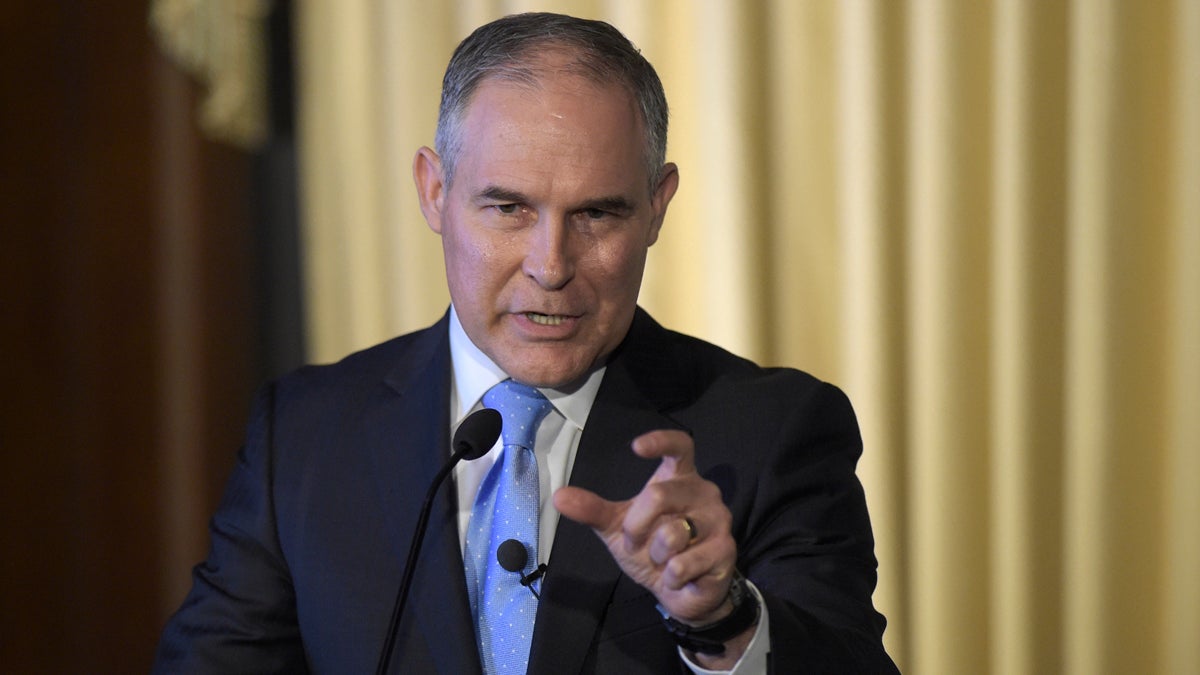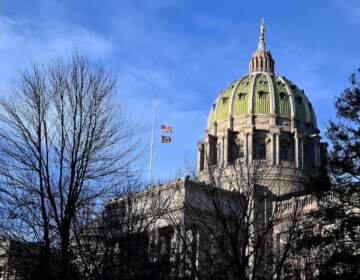Philly-area lawmakers question changes at EPA, Department of Energy
Many Democrats and some in the GOP have panned Environmental Protection Agency chief Scott Pruitt's move to bar scientists who've gotten EPA grants from serving as advisers.
Listen 5:17
Environmental Protection Agency Administrator Scott Pruitt has earned criticism from Democrats and some Republicans for barring scientists who have received grants from the EPA from serving as agency advisers. (Susan Walsh/AP Photo)
Democrats and some Republicans from the Philadelphia region are worried that Environmental Protection Agency Administrator Scott Pruitt is trying to gut his agency from within.
The EPA has worked overtime to undo many Obama-era environmental regulations, while also scrubbing its website of any mention of “climate change.”
That’s triggered several red flags for U.S. Sen. Bob Casey of Pennsylvania, who said he and other Democrats warned the GOP not to tap Pruitt to lead the agency.
“One of the many reasons I voted against him was that he doesn’t seem to believe in a mission of the agency, which is to protect the environment,” Casey said.
It’s not just Pruitt, the former Oklahoma attorney general. Republicans now control all the levers of power in Washington, and that has led to an increasing — though still relatively small — number of Republicans who want to disband the EPA altogether. Some believe environmental regulation should be left solely to the states.
“I don’t think, frankly, that you need an EPA,” said U.S. Rep. Liz Cheney of Wyoming. “When you’ve got … 98 percent of the environmental regulation being done effectively at the state level, that’s where it ought to be.”
Northeastern Republicans tend to be much more moderate — some might even say “liberal” — on environmental issues compared with their colleagues in the West and South. But that’s put them in an odd place in a party that is increasingly tacking further to the right.
Pruitt has been under fire recently after enacting a new rule that bars scientists who received EPA grants from serving as scientific advisers at the agency, while also tapping people from within the industries the agency oversees to serve as advisers. Those moves are decried by the left as an attempt to gut the EPA, but few in the GOP have been that outspoken on Pruitt.
“I voted for more robust funding for the EPA, but I can’t really comment because I haven’t been that close to what he’s doing,” said U.S. Rep. Tom MacArthur, R-New Jersey.
“Certainly, I think we should include scientific investigation in governmental analysis,” said U.S. Rep. Leonard Lance, another New Jersey Republican.
Lance is one of a handful of GOP lawmakers who say humans are accelerating climate change. But, unlike Democrats, he said he’s glad Pruitt is picking people with business expertise to advise the EPA too.
“I would like to see as broad array of experts as possible — and perhaps there could be other experts in the environmental community, who have not received grants,” he said. “But I would like to see experts from across the board, those from the industry, also those who have a scientific background.”
Congressman Ryan Costello, who represents parts of several counties west of Philadelphia, is one of the few in the GOP openly opposed to Pruitt’s new rule barring experts who have gotten grants from EPA from advising the agency.
“If my understanding is correct, then I would disagree with that conclusion, because where is the conflict?” Costello said. “And, in some respects, having had the opportunity to receive one of those grants, I would think you’d be even more scrutinizing of those who would receive it, and you have deeper appreciation the intent of a program.”
Energy policies also at issue
As for Pruitt himself, Costello said many of the Democratic complaints about him ring hollow.
“I look at the issues, perhaps I look beyond the headlines,” he said. “My feeling is some of what the objection or concern about him is what he might do, not what he has actually done.”
While Pruitt has received a lot of flak over what critics call “gutting the agency,” over at the Energy Department, Secretary Rick Perry is working to rewrite the government’s stance on coal. He has been trying to reward coal and nuclear power plants because, he said, they’re reliable sources of energy during a flood or an ice storm.
And that, said Costello, is a sign the administration is going backwards in terms of energy policy.
“Why are we trying to apply energy policy that might have made sense 20 years ago and retrofit it now? We’re trying to retrofit it yesterday into today. That doesn’t make sense to me.
“I think actually there’s even a larger story as it relates to energy policy with what he’s trying to do than what Pruitt’s trying to do,” Costello said.
But Pruitt has become the focus of Democratic attacks against the Trump administration’s stance on energy issues.
That’s, in part, because Pruitt’s claim to fame was suing the very EPA he now runs, said Philadelphia Congressman Brendan Boyle.
“Of all the pretty egregious nominees that President Trump had for Cabinet positions, Scott Pruitt probably wins the stiff competition for the worst,” Boyle said. “You have someone who’s the head of the EPA, whose only background experience in environmental law was suing the EPA more than any other person alive.”
The Trump administration doesn’t have many legislative accomplishments to hang its hat on so far, but it has worked vigorously to unwind environmental regulations. That has Democrats preparing to make environmental policy a central focus in the 2018 elections.
WHYY is your source for fact-based, in-depth journalism and information. As a nonprofit organization, we rely on financial support from readers like you. Please give today.




